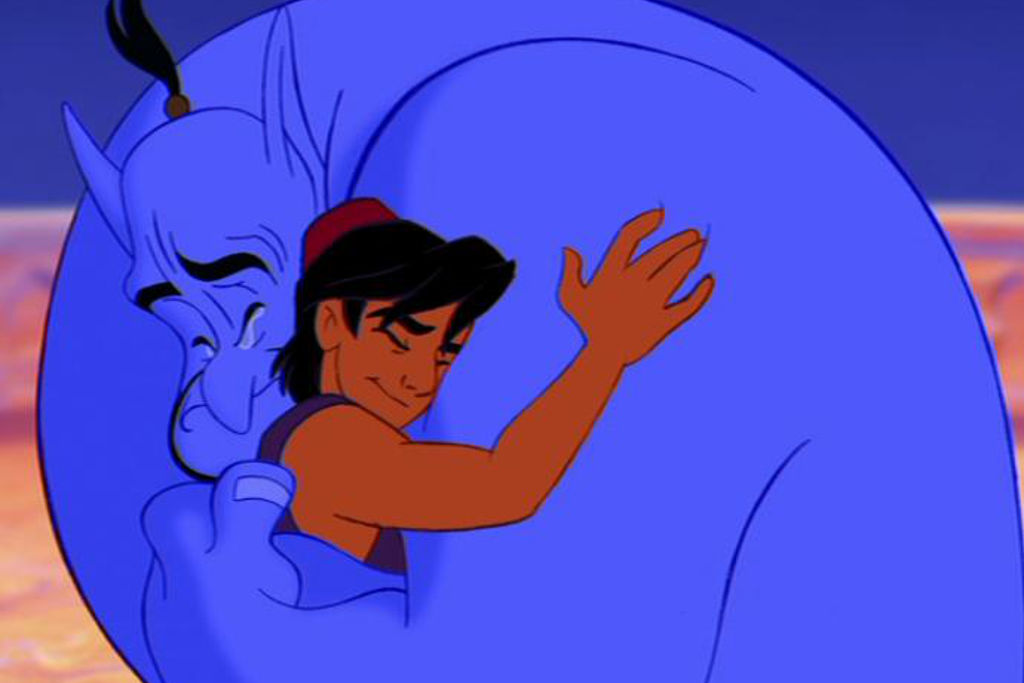A Celebration Of Robin Williams
There will only ever be one Robin Williams. Let's remember him for everything he was.

Today is a sad day for funny.
After the devastating news broke this morning, it took nary a minute for our Facebook feeds to become overtaken by images of the spitfire funnyman, each one reminding us of the legacy he left behind. Whether you grew up with Mork, longed to have your passion for life unleashed by a man like John Keating, sang along to his genie’s ‘Friend Like Me’, or sat down with the family to rewatch Euphegenia Doubtfire badge Pierce Brosnan’s Mercedes, Williams played a vital role in shaping your individual world of entertainment.
Williams was one of those performers whose signature look and personality boasted no comparison. His face like a rubbery Roman statue; his voice like an automatic weapon; and his energy as infectious as a child that only recently learned to run. He was a big, bright, otherworldly bear of an actor that underlined the ‘fun’ in funny.

It’s appropriate that Williams first found fame playing an interplanetary being, as Mork from Ork in both Happy Days and its late-’70s spin-off, Mork and Mindy. The story of Williams’ audition is a perfect encapsulation of the man: when producer Garry Marshall insisted he sit down, Williams took to the chair by standing on his head. Marshall has since justified the choice: “Williams was the only alien to audition”.
It was obvious from the outset that Robin Williams was a man who thrived in the moment.
While on the Mork set, Williams showcased his ability to improvise, consistently ignoring the script until the writers started just leaving space on the page for him to cut loose. This trait became a given in the years that followed — rather than giving him the reputation of a difficult actor, it became a drawcard, and paved the way for a slew of enigmatic, iconic film roles.
After playing Popeye (Popeye, 1980) and Garp (World According To Garp, 1982), Williams ensnared critics with his manic performance as a wartime disc jockey in Good Morning, Vietnam (1987) – a hilarious, yet sensitive portrayal that made perfect use of his improvisation. He could move audiences without sacrificing that impulsivity and energy, as he showed again while playing rogue English teacher John Keating, in Peter Weir’s Dead Poets Society (1989).
From that point onwards, Williams’ roles traversed the entire spectrum of performance. He went purely dramatic for 1991’s Awakenings, released his inner child in Hook (1991) and Aladdin (1992), and used 2002 to scare the shit out of us in One Hour Photo and Insomniac.
He gave us both over-the-top and understated comedy in Mrs. Doubtfire (1993) and The Birdcage (1996), and took home an Oscar for his humanistic performance as a no-bullshit therapist in Gus Van Sant’s Good Will Hunting (1997).
Off-screen, Williams’ was known to be just as generous with his humour as the real-life Patch Adams. During the filming for Schindler’s List (1993), Spielberg would put him on speaker phone in order to cheer up the cast and crew, and while Christopher Reeve was laying on his death bed, Williams turned up at the hospital with a Russian accent, masked by scrubs, to treat the Superman star — giving him his first laugh since his tragic accident.
I was lucky enough to catch Williams’ 2010 stand-up performance at the Sydney Entertainment Centre, where he zipped to all four corners of the stage and spat out a day’s worth of material in a few sweaty hours. Whether or not each joke landed, one thing was for sure: this was a true entertainer, and you couldn’t take your eyes off him if you tried. Sitting within his forcefield’s radius was an unforgettable experience.
As Alex McKinnon wrote this morning, “It seems bizarre that a man who brought so much joy into people’s lives was unable to find lasting joy in his own.” But as we mourn the loss of Robin Williams, let’s also celebrate the existence of a man who seemed to embody the very breath of life. We can only hope that on his good days, Williams was aware of how well loved he was by millions of complete strangers.
After I send this off, I’m moving my laptop to one side and celebrating this particular life by standing on my desk, then making a few random, nonsensical noises. Just because I can.
Rest in peace, Captain.
–